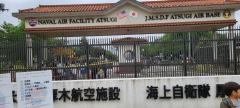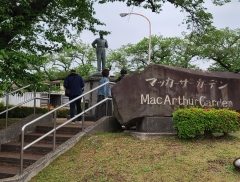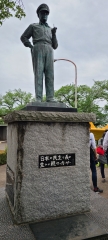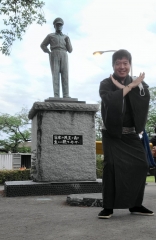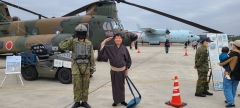25 April 2023
Is MacArthur a parent who gave birth to Japan’s democracy?
Last Sunday I visited Atsugi Air Base in Kanagawa prefecture, an hour train ride from Tokyo. The place is jointly used by both US and Japanese forces. There was an event to exhibit the aircrafts and associate with servicemembers working there.
Near the entrance I saw a very peculiar object. A statue of Douglas MacArthur who was a head of G.H.Q and SCAP organization during U.S. occupied Japan era (1945 to 1952). He entered Japan through this Air Base to occupy the whole of Japan.
What was very peculiar was the description carved below the statue. It was in Japanese, “Nihon-no-Minshushugi-no-Uminooya, MacArthur”, meaning MacArthur, a parent who gave birth to Japan’s democracy.
Is that so?
As far as my knowledge of history, that is partly true but not all true. In my opinion, FALSE.
Yes, during MacArthur era, a current democratic constitution was drafted and announced. Women’s suffrage was enacted. Freedom of speech and expression is protected in the constitution.
Right after the war, Japan was devastated due to the huge loss caused by the war. A lot of people felt betrayed by their own government and military. So MacArthur looked a savior.
However, such democratic movements had existed even before the war between US and Japan started. In 1920’s universal suffrage for men of 25 or over was enacted in Japan’s national assembly as a result of civil movement. In 1930’s women’s suffrage was enacted in the lower house of the national assembly but was rejected in the upper house. In fact, the amendment of the election law to give women’s rights to vote was announced in the national cabinet a few months after the war ended. That was before MacArthur announced the decree to do so and the constitution which bans gender discrimination was promulgated.
During the occupation era in Japan even after the democratic constitution became effective, when Korean War broke out in 1950, the GHQ and SCAP ordered the red purge in Japanese mainstream media outlets without legislation due to fear of rising communism. That was apparently against principle of democracy.
So the statement “MacArthur democratized Japan” was highly debatable.
Japan’s ex-Air Force Chief TAMAGAMI Toshio wrote in his book that he felt very uncomfortable seeing the statue and the description. I felt the same way. Seems like Americans boasting themselves and giving bad impression to us. I would suggest to replace the description plate with one simply stating "In memorial of Douglas MacArthur." That should be appropriate. We don’t respect such arrogant people so the statue did not help better friendship but undermines it.
US military is, in fact doing similar things in Okinawa, Japan as described in this article. I’ve been very angry with them.
In the event I took pictures with Japanese servicemembers and gave a salute to them. I can proudly say “Thank you for your service” to them because they are OUR TROOPS.
With US troops, I was being friendly to them because they themselves are individuals and officially so called “Allied Force”, on which we depend heavily although they are not as helpful as Japanese ordinary citizens expect to be. After all, they are “THEIR TROOPS.”
20:58 Posted in Japan News, Politics, US-Japan relationship | Permalink | Comments (0) | Tags: military, history, democracy
26 August 2007
Mistakes in Bush's speech!
Last Wednesday, President Bush made a speech to the veterans in Kansas, Missouri.
His speech has been criticized by Japanese media because of his lack of knowledge about our history.
He talked about the doubts regarding democratization of Middle East nations.
His remarks about how our country developed to today's democratic society were, in fact not accurate.
Quote:
"In the aftermath of Japan 's surrender, many thought it naive to help the Japanese transform themselves into a democracy. Then as now, the critics argued that some people were simply not fit for freedom.Some said Japanese culture was inherently incompatible with democracy. Joseph Grew, a former United States ambassador to Japan who served as Harry Truman's Under Secretary of State, told the President flatly that -- and I quote -- "democracy in Japan would never work." He wasn't alone in that belief. A lot of Americans believed that -- and so did the Japanese -- a lot of Japanese believed the same thing: democracy simply wouldn't work. "
Well, even in pre-war era, we had the democracy movement so called "Taisho Democracy." Taisho is the era between 1911 and 1925. That was the most active era for deomocracy movement. In 1925, the parliament passed universal suffrage law that gives all men of 25 and older rights to vote regardless of their income level. It was done by Japanese democracy activists.
As for Japanese women, Bush said.
"For example, Japan 's Vice Prime Minister asserted that allowing Japanese women to vote would "retard the progress of Japanese politics."It's interesting what General MacArthur wrote in his memoirs. He wrote, "There was much criticism of my support for the enfranchisement of women. Many Americans, as well as many other so-called experts, expressed the view that Japanese women were too steeped in the tradition of subservience to their husbands to act with any degree of political independence." That's what General MacArthur observed. In the end, Japanese women were given the vote; 39 women won parliamentary seats in Japan 's first free election. Today, Japan's minister of defense is a woman, and just last month, a record number of women were elected to Japan 's Upper House. Other critics argued that democracy -- (applause.) "
In pre-war era, there were women's suffragist activists in our country. They fought against the nation's male chauvinistic tradition. One of them, most famous one of all was Ms. Raicho Hiratsuka. She published women's liberation magazine "Seito (literary meaning is Bluestocking)" In the first issue of the magazine, she claimed "In the beginning women were suns that can shine themselves. Now we are like moons that shine only by others' lights. Let's get back our hidden suns."
In fact they made some achievement in pre-war era, they amended the law that barred women from attending political meetings in 1922. Then in 1930 they had lower parliament to pass the law that gives women's local voting rights but rejected by upper house which was dominated by peer members like House of Lords in England. Next year war in China started. The nation leaned towards militaristic mood.
Women's suffrage was approved after the WW 2, but such movement existed strongly even before. So that is why women's liberation became so successful in postwar era. Not just by the U.S. occupation.
Bush tried to compare Japan's democratization and cases in the Middle East. But two nations were foundamentally different. Our nation was pretty much homogeneous whereas Middle East is muti-national. Our country's democratization was easier because national unity was strong. In the places where the unity was so weak, "free" means disassociation, no base for authoritative entity. No trust in government. The government cannot manage economics and security. Just anarchism preveils. Anarchism is different from liberation or democratization. Just chaos, worse than tyranny.
Mr. Bush and Americans, please study more about history and the politics.
15:40 Posted in Politics, US-Japan relationship | Permalink | Comments (0) | Tags: democracy, feminism, Bush






